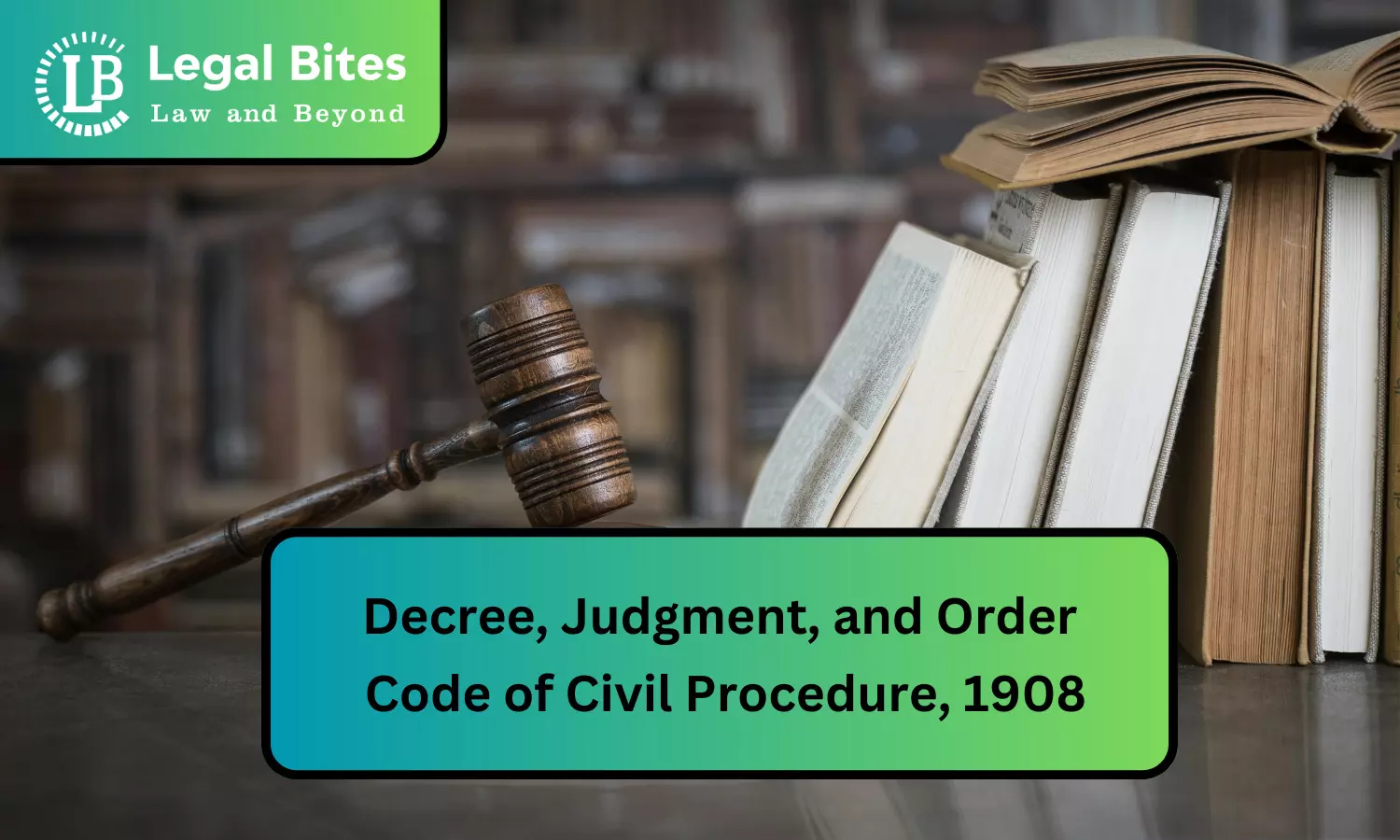Decree, Judgment and Order | Code of Civil Procedure, 1908
This article explores these concepts in detail, highlighting their definitions, essential characteristics, and key differences.

The Code of Civil Procedure, 1908 (CPC) provides a well-defined structure for the adjudication of civil disputes. It lays down rules and procedures for the courts to follow while delivering justice. Among the key concepts under CPC are decree, judgment, and order, which form the backbone of civil litigation. Though these terms are often used interchangeably, they have distinct meanings and legal implications.
Judgment under CPC
Definition of Judgment
Section 2(9) of CPC defines judgment as:
"Judgment means the statement given by the judge on the grounds of a decree or order."
A judgment is a formal expression of a judicial decision given by a court in a lawsuit. It consists of the reasoning and conclusions of the judge, which lead to the passing of a decree or an order.
Essentials of a Judgment
According to Order XX Rule 4 of CPC, a judgment must contain:
- A Concise Statement of the Case – A brief outline of the facts of the case.
- Points for Determination – The issues that need to be decided by the court.
- Decision on Each Issue – The findings of the court on each point of law and fact.
- Reasons for Decision – The rationale behind the decision.
- Final Order – The ultimate ruling of the court.
Types of Judgments
Judgments can be classified into:
- Final Judgment – A judgment that completely determines the rights of parties.
- Interlocutory Judgment – A judgment that settles a preliminary issue before the final adjudication.
Pronouncement and Signing of Judgment
As per Order XX Rule 1, judgment must be pronounced in open court within 30 days of the hearing, and in exceptional cases, within 60 days. It must be signed by the judge immediately after pronouncement.
Decree under CPC
Definition of Decree
Section 2(2) of CPC defines a decree as:
"A decree is the formal expression of an adjudication which conclusively determines the rights of parties with regard to all or any of the matters in controversy in a suit."
It follows the judgment and marks the end of the litigation process in a civil case.
Essentials of a Decree
A decree must satisfy the following conditions:
- Adjudication – There must be a judicial decision by a court.
- Formal Expression – The decision must be expressed formally.
- Determination of Rights – It must conclusively determine the rights of parties.
- Conclusive Nature – It should settle the controversy in the suit.
- In a Suit – It must arise from a civil suit (not from applications or proceedings).
Types of Decrees
Decrees can be classified into:
- Preliminary Decree – Determines rights of parties but does not dispose of the suit completely. E.g., partition suit, dissolution of partnership.
- Final Decree – Completely disposes of the suit and settles all issues.
- Partly Preliminary and Partly Final Decree – A decree that is both preliminary and final, depending on the context.
Decree v. Judgment
| Aspect | Judgment | Decree |
|---|---|---|
| Definition | Statement of reasons by the judge. | Formal expression of a judicial decision. |
| Scope | Covers findings, reasons, and decisions. | Deals with conclusive rights of parties. |
| Includes | Explanation of facts, evidence, and law. | Determination of legal rights. |
| Execution | Cannot be executed. | Can be executed through legal enforcement. |
Order under CPC
Definition of Order
Section 2(14) of CPC defines an order as:
"Order means the formal expression of any decision of a Civil Court which is not a decree."
An order is a judicial decision, but unlike a decree, it does not conclusively determine all rights of parties in the suit.
Essentials of an Order
- Must be a Formal Expression – Like a decree, it must be officially recorded.
- Decision of a Court – It should be passed by a civil court.
- Not a Decree – It must not conclusively determine all rights of the parties.
Types of Orders
Orders can be classified into:
Appealable Orders – Orders specified under Order XLIII Rule 1 of CPC, such as orders rejecting applications for setting aside an ex parte decree.
Non-Appealable Orders – Orders that cannot be directly appealed.
Order v. Decree
| Aspect | Order | Decree |
|---|---|---|
| Definition | Formal expression of a judicial decision that is not a decree. | The formal expression of an adjudication that determines rights conclusively. |
| Nature | Can be final or interlocutory. | Always conclusive of rights. |
| Appealability | Some orders are appealable. | Every decree is appealable unless barred by law. |
| Number in Suit | Multiple orders can exist in a suit. | Only one final decree is passed in a suit. |
Key Differences Between Judgment, Decree, and Order
| Feature | Judgment | Decree | Order |
|---|---|---|---|
| Definition | Statement of reasons given by the judge. | Formal expression of an adjudication determining rights. | Formal expression of a court’s decision that is not a decree. |
| Scope | Covers reasoning, findings, and conclusion. | Determines rights conclusively. | Determines procedural or substantive aspects. |
| Execution | Cannot be executed. | Can be executed. | Some orders are executable. |
| Appealability | No separate appeal for judgment. | Appealable under CPC provisions. | Some orders are appealable. |
| Finality | Can be followed by decree or order. | Always conclusive unless reversed on appeal. | May be interlocutory or final. |
Conclusion
Understanding the differences between judgment, decree, and order is crucial in civil litigation. While a judgment provides reasoning and conclusion, a decree gives formal expression to the court’s adjudication of rights, and an order deals with procedural or interlocutory matters. Each has distinct legal consequences, particularly concerning appeals, execution, and enforceability under CPC.

